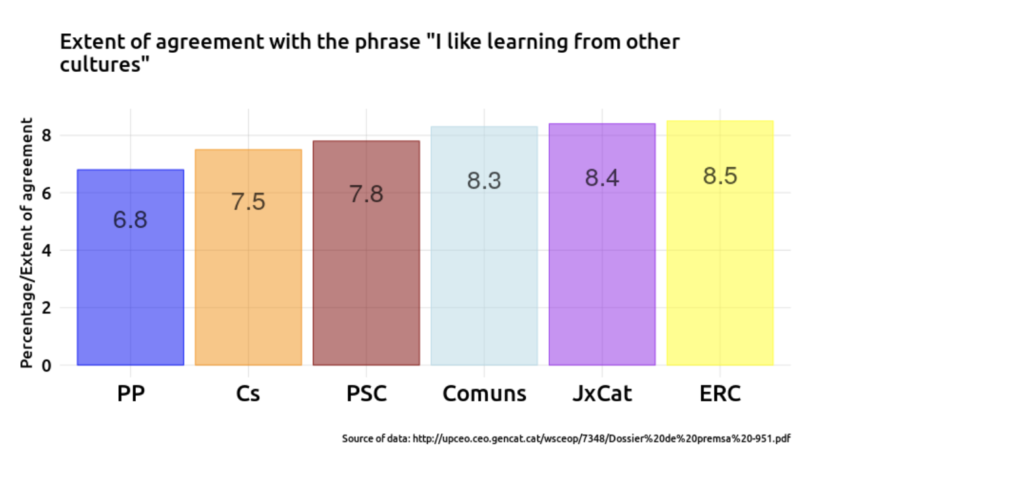22.02.2020 - 09:17
|
Actualització: 22.02.2020 - 10:17
The argument is made, again and again, in the Spanish Congress, the Catalan Parlament, the Madrid media, on TV, in radio, and in print, that pro-independence Catalans hate people from Spain. Independentists are frequently called ‘xenophobes’, ‘racists’, and ‘supremacists’. The pro-Spain right maintains this position (sometimes to a surreal extreme), and the pro-Spain left generally echoes it.
But it is simply false. Completely false. All available data on the topic show – again and again – (a) that pro-independence Catalans are less xenophobic than their anti-independence counterparts, (b) that Catalans like people from the rest of Spain more than people from the rest of Spain like Catalans, and (c) that Catalans’ positive feelings towards people from the rest of Spain also extend to people from the rest of the Spanish State.
Those who are worried about xenophobia, supremacism, and racism in Catalonia and Spain have legitimate cause to be concerned; but directing that concern at pro-independence Catalans misses the mark. Xenophobic and supremacist attitudes are more prevalent among anti-independence Catalans, and dislike of Catalans among Spaniards is quantifiably greater than dislike of Spaniards among Catalans (including those who are in favor of independence).
This article is brief and written in the format of three (false) affirmations followed by their (evidence-based) counterarguments.
1. ‘Pro-independence Catalans are xenophobic’
Xenophobia, the fear or dislike of outsiders, is a common accusation aimed at pro-independence Catalans. It’s not supported by evidence; in fact, all available evidence shows the opposite.
Voters of pro-independence parties agree to a greater extent with the phrase ‘I like learning from other cultures’ than voters of anti-independence parties.
Pro-independence Catalans agree to a greater extent with the phrase ‘No specific culture is superior to others’ than voters of anti-independence parties.
Anti-xenophobic feelings among pro-independence Catalans translate into pro-immigration positions. For example, pro-independence Catalans are more in favor of spending more money on welcoming immigrants than their anti-independence counterparts.
Likewise, pro-independence Caatalans are far less likely to say that immigrants should ‘abandon their culture’ when they come to a new country than their anti-independence counterparts.
By the same token, pro-independence Catalans are far less likely than their anti-independence Catalans to feel that ‘so much immigration’ makes them ‘feel less at home’.
These feelings translate into support for specific policies. Catalans who are against independence are also more likely to want to impose strict limits on the number of foreigners or completely ban their entry.
2. ‘But all those data are about foreigners. Catalan xenophobia is targeted at Spaniards’
A common response to the data showing that voters of anti-independence parties exhibit more xenophobic attitudes than their pro-independence counterparts is to point out that, sure, Catalans are pro-immigration, but that’s because they concentrate their xenophobic feelings towards Spaniards. Could this be true?
The data, again, show the opposite. The below chart shows how people from one ‘autonomous community’ (x-axis) feel about people from other autonomous communities (y-axis) on a 0-10 scale with 0 being ‘I don’t like them at all’ and 10 being ‘I like them a lot’.
Let’s do a breakdown by autonomous community. If we look at what the inhabitants of each autonomous community think of Catalans (orange point) and compare it to what Catalans think of the people of that autonomous community, we find that the people of that area dislike Catalans more than Catalans dislike them. Without exception.
On average, Catalans ‘like’ residents from the rest of the Spanish State to a degree of 6.8. Those from the rest of the State give a score of only 5.6 to Catalans. I’ve written more about this specific subjct here in Catalan and here in English.
3. ‘Okay, Catalans on average aren’t xenophobic, but pro-independence Catalans are’
One of the common responses to the above data is ‘sure, you have shown that on average Catalans don’t dislike Spaniards, but that’s because you’re not differentiating between pro-independence and anti-independence Catalans; the pro-independence Catalans surely dislike Spaniards’.
Again, false.
The below chart again shows the “sympathy matrix”. The colors / values indicate what people from one place (x-axis) think about people from another place (y-axis), with 0 being ‘I don’t like them at all’ and 10 being ‘I like them a lot’. But in this case, we’ve included only pro-independence Catalans on the x-axis (that is, the vertical column of points about ‘Catalunya’ refer only to what pro-independence Catalans think of the rest of Spain).
Let’s examine only what the pro-independence Catalans think of people from the rest of Spain (below). Again, we find that even pro-independence Catalans like Spaniards more than Spaniards like Catalans in every case (except Madrid, where the difference is within the uncertainty interval).
The weighted average of the score given by people from the rest of Spain to Catalans is 5.63. The weighted average of the score given by Catalans to people from the rest of Spain is 6.77. Among pro-independence Catalans, the weighted average of the score they give to people from the rest of Spain is 6.48.
Conclusion
The data are fairly clear on this subject:
- Catalans (including pro-independence Catalans) like people from the rest of the Spanish State.
- In fact, Catalans (including pro-independence Catalans) like people from the rest of the Spanish State even more than people from the rest of the Spanish State like Catalans.
Those who continually drive forward a narrative of Catalan ‘hatred’ or ‘supremacism’ towards the rest of Spain would do well to try to understand the difference between (a) anecdote and (b) data. Given the data on the matter, insisting (as mainstream political parties often do) that Catalans and/or independentists ‘dislike’ Spaniards suggests that one is either (a) ignorant of the data or (b) intentionally lying.












